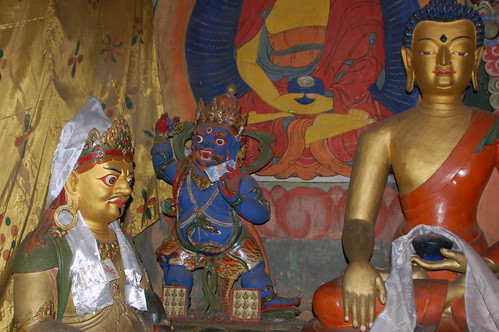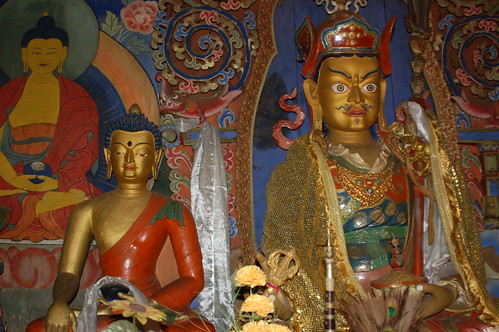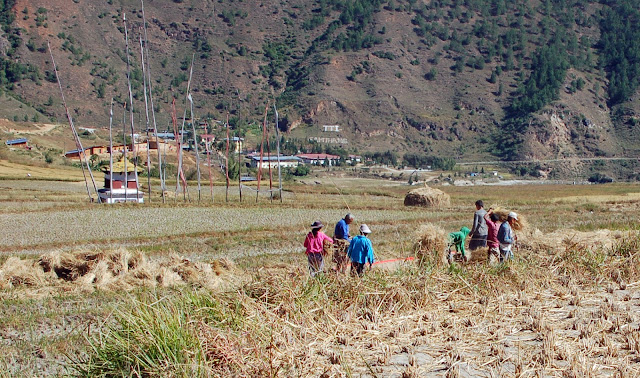Thursday, March 24, 2022
Where to go from here?
We streamed LUNANA: A YAK IN THE CLASSROOM this week. Nominated for an Oscar as Best International Feature Film, the movie tells the story of a young Bhutanese teacher dispatched, over his objections, to the most remote school in the country, a 10 day hike into the Himalayan foothills. His electronic devices go dead, keeping a fire burning requires collecting yak dung, and the school doesn't even have a blackboard. But the children turn out to be bright and eager to learn, the village leader's daughter teaches him to appreciate the magic of this remote valley, and even to how to get along with Norbu, the yak who lives in the classroom. Too soon, the teacher leaves this beautiful place, returns to accomplish his urban dream of emigrating to Australia -- and realizes that he may have left behind something vital.
Sounds trite, doesn't it? And maybe it is. The actors are beautiful and the scenery majestic. The film was an unalloyed joy to watch.
Yet I realized overnight that the film had stayed with me; there's depth in it.
I had the privilege of traveling in Bhutan in 2013. It was a fascinating place: a constitutional monarchy with a governing parliament, chosen by elections that international observers characterize as largely free and fair. The state aims to give all Bhutanese young people a modern education. In a country with many local dialects, all students learn English along with Dzongkha. Education promotes Western science; urban dwellers are plugged in citizens of the world. Yet Bhutan is also trying to keep its distinctive Buddhist culture alive and flourishing. Professional life is carried on in traditional dress; politicians compete to promote "Gross National Happiness" as well as security, health, and prosperity.
None of this is easy to balance. People we encountered in 2013 openly discussed whether the balance -- old and new, capitalist and cooperative, scientific and spiritual -- that makes Bhutan feel unique could be sustained. The tiny kingdom sits between Indian and China, both seeking influence. It has a Nepali minority who are very poorly treated. And if Bhutanese are really free, will they continue to want to preserve the national way of life?
These questions are the subject of Lunana. The filmmakers don't bash you over the head with them, but they are all there to ponder amid the gorgeous scenery. Highly recommended.
Saturday, May 29, 2021
Where the pandemic is reinforcing concern for the common good
Not all small Himalayan states adjacent to India are in the terrible straits to which the coronavirus has reduced Nepal.
 |
| Thimphu, Bhutan's capital from above |
It took less than two weeks for the Himalayan kingdom of Bhutan to vaccinate almost all of its eligible population.The country's vaccination campaign kicked off on March 27. By April 8, according to the Ministry of Health, 93% of eligible adults had gotten their first dose. Officials said 472,139 people between ages 18 and 104 had been vaccinated as of that date, and they urged other eligible individuals to follow suit.
In a statement, Health Minister Dasho Dechen Wangmo described the campaign as a "sense of purpose that each of us is embracing to protect our country and the people we love." She urged individuals to get vaccinated to protect themselves and their communities — as well as King Jigme Khesar Namgyel Wangchuck. ...
... State-owned newspaper Kuensel stated in an editorial that the country's efforts to fight the coronavirus pandemic have been "exemplary right from the beginning," thanks to leadership, front-line workers and what the paper describes as a cooperative public.
While noting it's premature to celebrate before people have had their second doses, it said that the country's size had certainly contributed to the vaccine's successful rollout — and that this has implications for tackling other issues related to the economy, unemployment and technology.
"As we realise the advantage of our smallness from the vaccination programme, it is a lesson too valuable to not replicate in our other endeavours," it concluded.
Bhutan may not be a paradise of happiness, but cultivating a societal ethic of care for the common good sure pays off in a pandemic.
Saturday, December 28, 2013
Saturday scenes and scenery: just an ordinary building
The central panel portrays the four harmonious friends of Tibetan bhuddism.
These four mountain creatures run around the frieze. Every moderately prosperous building and residence that I saw in Bhutan was covered with such paintings. They aren't for tourists; they are there because Bhutanese like them. They advertize prosperity and right concern for the order of things.
These women sat on the steps of the building, consulting over a knitting project.
In the street, a cow might wander by.
Click on any of these photos to see enlarged.
Sunday, December 08, 2013
An endangered language?

A friend suggested that I might want to look into a website called Priceonomics.com. She was right. The business of the site seems to be crawling the web for data and selling the results; their blog is a potpourri of odd and less odd factoids collected along the way. It's fun for a stats geek.
I was particularly struck by a posting that reports: Only 4% of Languages Are Used Online. The author became aware that his Egyptian friends largely used Latin characters on the web rather than Arabic letters. Arabic is in no danger of erasure by technological change, but the web does "endanger" many less widely used tongues.
This fit with some of what I saw on my recent trip to Bhutan. Dzongkha, the national language of Bhutan, is just the sort of language that gets left out of the international discourse on the web. According to an article in the Wikipedia, on Wikipedia, only about 160,000 of the Bhutanese are native speakers; the other 540,000 have other home tongues. Though Dzongkha is required for official business and is used for self-consciously Bhutanese culture (see this artist, for example), the language of instruction in the schools is English. English serves to bridge language gaps between Bhutanese and also with their large, sometimes culturally encroaching, neighbor India. And English is easily used on the web.But thousands of other languages may never make the leap into the digital age. A full 96% of the world’s 6,000+ languages appear to be dead when it comes to use on cell phones, laptops, and tablets, meaning that the Internet could be to languages what a certain comet was to the dinosaurs.
…Linguists note the extinction of languages with some pessimism: around 2,500 out of 7,000 languages spoken today are endangered. But the picture [mathematical linguist András] Kornai emerges with is much more alarming. Only about 170 languages, or 2%, are vital or thriving online. Another 140 (1.7%) are borderline cases. The remaining 96% (over 6,000) are still or “digitally dead.” And in Kornai’s opinion, given the prerequisites of a strong publishing infrastructure that includes technical tools to make it possible to use a language on digital devices and broad use by the younger generation, those 6,000+ languages have no hope of making the leap into the digital future.
Bhutan is one of the those countries which is leaping much of the industrial age to move directly into the digital one. Instead of installing the wiring for telephone communication, they've gone straight to ubiquitous cell phone coverage. People don't listen to radio; because so many have electricity, a byproduct of the national export of hydropower to India, they've gone straight to television and computers.
 |
| A Bhutanese living room in an unpretentious house |
Bhutan aims to retain much of its traditional culture while adapting and succeeding in a very different present. Language will be an issue and could be a stumbling block …
Friday, November 29, 2013
Friday cat blogging: a few Bhutanese felines
...including at the feet of this large monk.

This one was along the roadside at Chimi Lhakang.

And this one was one of the few residents of the disused former royal palace at Bumthang.

This one ruled the roost at a rural temple ...

while this one hunted among cut rice stalks.

This creature lives with the nuns at a mountain nunnery.
Tuesday, November 26, 2013
Bhutan: can it preserve while modernizing?
 |
| Bhutan is erecting the world's tallest statue of the Buddha at its capital Thimpu. |
These questions seem to me on the right track. They are all questions about how Bhutan combines the mixed blessings of modernity -- capitalism, democracy, Western science, education, medicine -- while trying to preserve its particular heritage.Do they then have a wealthy class who suck up what income there is? Their lifestyle, as you photographed it, reminds me of the Mongolians with the way parts of modern life have come but not enough income in their traditional raising of animals to support anything but minimal living. The beauty of such is great but hard to imagine living that way.
 |
| There are fearsome powers in this world. |
 |
| The court is within the traditional administrative center, the local dzong: a massive temple/monastery/fortress and court building. National dress is required to transact business in the dzong. |
 |
| There are strict rules for visits to sacred sites. |


The in-flight magazine of Bhutan's national airline, called Tashi Delek -- On the Wings of Dragons, pointed me to an extremely accessible dissection of some of these issues. Helena Norberg-Hodge writes about Ladakh, a region of Indian-administered Kashmir. Her insights also seem relevant to Bhutan's struggle to balance ancient and modern elements -- with the significant difference that the Bhutanese have very consciously anticipated the threats from modernity as well as its benefits.
Bhutan is striving to prove that this is possible. I can only wish these warm, smart people well.… does development have to mean destruction? I do not believe so. I am convinced that the Ladakhis and other traditional peoples could raise their standard of living without sacrificing the sort of social and ecological balance that they have enjoyed for centuries. To do so, however, they would need to maintain their self-respect and self-reliance. They would need to build on their own ancient foundations rather than tearing them down, as is the way of conventional development.
Monday, November 25, 2013
Bhutan: rice harvest time
Harvest scenes throw many of us into images from history I think. This is not the farming we've observed.
Sunday, November 24, 2013
Some Bhutanese young people

These are middle school students at morning assembly. We were told that one third of Bhutanese are in some kind of schooling and that the country (population ca. 700,000) produces 3000 college graduates annually. It is not clear Bhutan produces a commensurate number of jobs requiring higher education.
Saturday, November 23, 2013
A few Bhutanese ...
This gent was harvesting turnips, for animal feed I think.
She watched us from her doorway ...
He stalked out to get a better look at us ...
Her delight in our appearance was not rare.
This city fellow saw no reason to interrupt his conversation to attend to passing tourists.
Over the next few days I'll be posting a bounty of photos from Bhutan ... tomorrow a selection of beautiful children and young people.
Friday, November 22, 2013
Friday critter blogging: Bhutan lets sleeping dogs lie

Few sights in Bhutan amazed me more than this one on market day in the town of Paro.

In Bhutan, dogs seem to plunk down wherever they wish and apparently doze contentedly.

Fear seems no part of their experience.
In this, Bhutan is very different from other poor countries where I have visited. In ten days, I only saw a human hit a dog once, apparently because the striker thought the animal might be bothering foreign tourists who had less friendly attitudes toward a stray. The dogs seem well fed. In Thimphu, the capital and only large city, they do bark incessantly at night, but otherwise practice the same contented behavior as their rural cousins. (There appear to have been only a few breed ancestors to these Bhutanese mutts.)
This article suggests that the apparent health and well being of Bhutanese dogs is related to people's adaptation to their equivocal relationship to meat-eating. As devout Buddhists, Bhutanese are ostensibly mostly vegetarians, but in fact they do consume meat. Their dogs conveniently dispose of the associated offal. Or so the article claims. It also reports a humane effort to sterilize 4000 of Thimphu's dogs to reduce the evening cacophony.
Thursday, November 21, 2013
Homecoming, a kludge, and reason to hope

Back on the ground in the USA, I see we are living through a panic about the long delayed launch of what this country has been able of offer as a response to human infirmity. That Obamacare, that unwieldy kludge, is struggling with its own complexity is not surprising. When you promise to preserve a mass of historically accreted work-arounds and pockets of private profit, it is not surprising that you get a mess.
It's worth going the root of why this mess inspires such fanatical resistance. In a nutshell, from Thomas Edsall:
Yes indeed, a dwindling white majority doesn't want "its taxes" used for "those people." And it can't hear that Medicare changes are designed to squeeze profiteers who drive cost increases, not the patients.… the Affordable Care Act can be construed as a transfer of benefits from Medicare, which serves an overwhelmingly white population of the elderly – 77 percent of recipients are white — to Obamacare, which will serve a population that is 54.7 percent minority. Over 10 years, according to the Congressional Budget Office, the Affordable Care Act cuts $455 billion from the Medicare budget in order to help pay for Obamacare.
Those who think that a critical mass of white voters has moved past its resistance to programs shifting tax dollars and other resources from the middle class to poorer minorities merely need to look at the election of 2010, which demonstrated how readily this resistance can be used politically. ….
Fortunately, however miserable the interim will be -- and people will suffer unnecessarily during it -- the last few decades in California have showed that betting against the inevitable browning of the United States initiates a political death spiral for the party that chooses that path. Republicans are marginalizing themselves. And good riddance to them! Exclusion, greed and resentment are ugly -- our dark side -- the antithesis of what can make this society exceptionally good.
Tuesday, November 19, 2013
Bhutan: obligatory beer post
Leaving Bhutan
He was on the right track. Here's one of the more accessible locations we scrambled to, a monastery and temple above the town of Paro:All the best temples with the coolest layouts are at the top of nanny-goat climbs up narrow mountain paths. You should be in heaven, but be careful.

I fly home within the next 24 hours. More pics and a few reflections over the next few weeks when I have less fickle wifi.
Monday, November 11, 2013
Bhutan too shares a war memorial

Wednesday, November 06, 2013
Warming Wednesdays: Hydropower development in Bhutan
Here's something I doubt I'll see anything of during my trip (see previous post): a national development strategy for Bhutan that builds friendly ties with its gargantuan Indian neighbor -- and provides electricity in a relatively sustainable fashion. Global warming will certainly increase Himalayan run-off in coming years. Presumably these smart mountain survivors are building for flooding as well as exploiting steady flows.
This post was queued up before I left for Bhutan.
Tuesday, November 05, 2013
"Leaving on a jet plane ... "
That, I suspect, fits the bunch I've signed on with.cautious expansion of the tourist sector, encourag[ing] visits by upscale, environmentally conscientious tourists.
So why am I going to Bhutan? There are mountains, and people, and sights I've probably never imagined. Essentially I am going because I can, economically and physically. Neither condition will last forever. Meanwhile, I go and I will try to see and to take pictures. A short trip is not long enough to learn anything very significant about a somewhere new, especially a place with a truly different history and language than my own.
But even a short trip may change me. We'll see.
I may or may not have WiFi some places. If so, I may post at least some pictures. I have lined up some posts here (not every day but often) for the period of the trip … and will be back to regular posting by late November.
 | |
| Click to embiggen. |



























